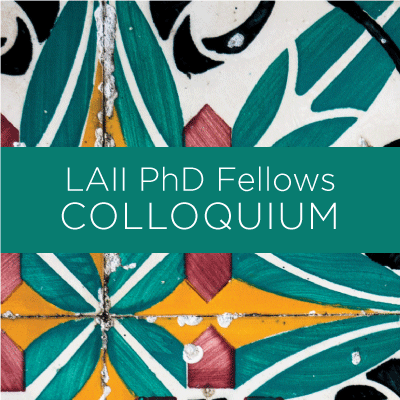LAII PhD Fellows Colloquium

Friday, March 29, 2019 | 12:00 pm - 01:30 pm
Latin American and Iberian Institute
801 Yale Blvd NE (campus building #165)
About:
Each year the LAII awards PhD Fellowships to meritorious doctoral students whose research relates to Latin America. The LAII's current PhD Fellows represent the departments of Linguistics; Spanish and Portuguese; Biology; Anthropology; History; Latin American Studies; Political Science; and Language, Literacy, and Sociocultural Studies.
The annual PhD Fellows colloquium provides the LAII community with a chance to hear from these exceptional scholars, and to generate cross-campus dialogue among Latin Americanist graduate students. and faculty. We hope you can join us as we hear from the following students:
Diego Bustos, Spanish and Portuguese
Writing the Center: A Transnational Approach. Agonistic Aesthetics and Middle-Class Politics in Brazil and Colombia
The research project analyzes a corpus of cultural performances and novels that reflect on how the effects of growth and anti-poverty public policies (Bolsa Família and Familias en Acción) comment on questions of citizenship and economic inclusion in Colombia and Brazil. Diego is a fifth-year doctoral student in Hispanic and Portuguese literature in the Spanish and Portuguese Department at the University of New Mexico. His research interests focus on discourses of social mobility and new middle classes in contemporary literary production of Latin America, particularly in Colombia and Brazil.
Maria Teresa Guevara Beltran, Language, Literacy and Sociocultural Studies
Transborder Testimonios of Second Language Learning and Socialization
This qualitative study utilizes the Latin American tradition of Testimonio and a Chicana/feminist lens to explore Spanish-speaking immigrants’ experiences of migration, language learning and socialization. Maria Teresa is a PhD candidate in the department of Language, Literacy and Sociocultural Studies. Her current research interest revolves around the intersection of identity, race, gender, and socio cultural issues in the processes of second language learning and socialization experiences of marginalized immigrants. She is the Director of Educational Programs at Encuentro, a community based organization that offers educational opportunities for Spanish-speaking immigrants.
Beau Murphy, Archaeology
Architecture and Imperialism: A Case Study from the Inka Empire
State societies in the past and present often construct buildings that serve as symbols of something beyond their practical function. In some instances this appears to factor into strategies of imperial control, where monuments or grand civic building are placed in newly conquered territories to remind subjects of the power of the empire. This presentation discusses in-progress doctoral research that builds upon these principles via archaeological investigation of an Inka (AD 1436-1532) imperial archaeological site in northern Chile, and the author's efforts to determine how the Inka Empire may have reorganized the architecture of this ancient community with a similar strategy in mind. Beau acquired a B.S. in Environmental Science from Humboldt State University before obtaining an M.A. in Anthropology with a concentration in Archaeology from UNM. He has conducted fieldwork regularly in Peru and Chile since 2012 with a central research focus on the archaeology of the Inka Empire.
Fiorella Vera-Adrianzén, Political Science
Building Citizenship: Participation of Victims in Peru’s Post-conflict Reparative Justice Process
Focusing on Peru’s Plan Integral de Reparaciones (PIR, Comprehensive Reparations Program) for victims of the civil conflict (1980-2000), Fiorella's research sheds light on victims’ mobilization and participation in the subnational implementation of reparative justice and examines how these experiences have shaped their perceptions of citizenship. Her presentation will highlight findings, challenges, and learned lessons from working with Quechua communities who endured human rights violations and have been fighting to achieve justice for the last four decades. Fiorella is a Doctoral Candidate in Political Science, focusing on post-conflict justice and human rights in Latin America, as well as grassroots mobilization and subnational politics in the region. Her dissertation examines the effects of reparations at the individual and community levels in post-conflict Peru, where she has been conducting fieldwork in Quechua, supported by the LAII Ph.D. Fellowship, the Fulbright-Hays Scholarship, and the Inter-American Foundation Fellowship.
Notes:
This event is free and open to the public.
Sponsors:
Latin American and Iberian Institute
